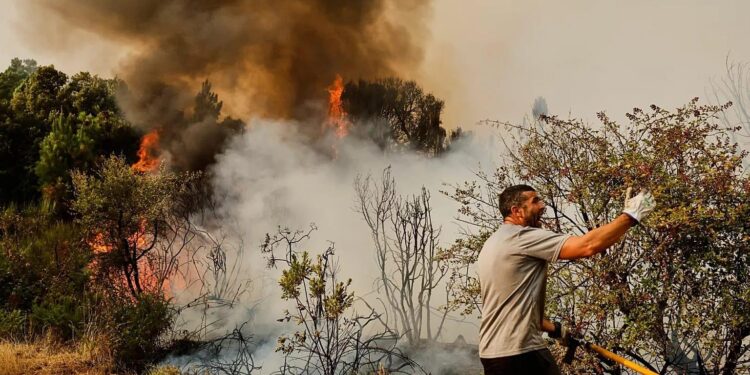Firefighters in Turkey and Cyprus are grappling with relentless wildfires as an intense heatwave scorches the region, Reuters reports. The extreme temperatures and dry conditions have fueled numerous blazes, overwhelming emergency services and threatening communities across both countries. Authorities are deploying additional resources in a race to contain the fires, which have already destroyed vast areas of forest and forced evacuations, highlighting the escalating challenges posed by climate change in the Mediterranean.
Firefighters Grapple with Escalating Wildfires Amid Record-Breaking Heatwave
Intense wildfires have engulfed vast areas across Turkey and Cyprus as record-breaking temperatures persist, significantly hampering firefighting efforts. Over 500 firefighters are battling flames that have consumed thousands of hectares of forest and agricultural land. The extreme heatwave, with temperatures soaring beyond 45°C (113°F) in some regions, has not only accelerated the spread of the fires but also pushed emergency responders to their physical limits. Smoke from the blazes has forced evacuations in several villages, leaving residents anxious and vulnerable. Authorities have deployed additional resources, including aerial water bombers and heavy machinery, but the dry conditions and relentless heat complicate containment strategies.
The escalating wildfire crisis has prompted urgent calls for increased international assistance and a reassessment of regional disaster preparedness. Below is a quick overview of the wildfire impact as of the latest reports:
| Region | Area Burned (hectares) | Firefighters Deployed | Evacuations |
|---|---|---|---|
| Southern Turkey | 12,000+ | 300 | 5,000+ |
| Cyprus Coastal Areas | 4,500 | 150 | 1,200 |
| Inland Forest Reserves | 7,000 | 60 | 500 |
- Air support: Water-dropping helicopters and planes operating continuously.
- Local authorities: Coordinating evacuation centers and relief aid.
- Community efforts: Volunteers assisting firefighting and evacuation logistics.
Regions Face Severe Air Quality and Evacuation Challenges as Flames Spread
Communities across Turkey and Cyprus are grappling with hazardous air quality levels as wildfires continue their relentless advance. Thick plumes of smoke have enveloped entire cities, leading to widespread visibility issues and respiratory health concerns. Local authorities have issued multiple warnings advising residents to remain indoors, particularly vulnerable groups such as children, the elderly, and those with pre-existing respiratory conditions. The combination of soaring temperatures and strong winds has exacerbated the situation, making containment efforts even more difficult.
Evacuation orders are being enforced in numerous districts, with emergency services prioritizing swift and safe relocations amid chaotic conditions. The challenges faced by first responders include:
- Rapidly shifting fire lines: Unpredictable wind changes are causing the flames to spread in unexpected directions.
- Overwhelmed shelters: Temporary evacuation centers are nearing capacity as displaced residents seek refuge.
- Traffic congestion: Evacuation routes are suffering heavy congestion, delaying rescue and support operations.
| Region | Air Quality Index (AQI) | Evacuation Status | Fire Spread Rate (hectares/hr) |
|---|---|---|---|
| Antalya, Turkey | 240 (Hazardous) | Mandatory Evacuation | 15 |
| Larnaca, Cyprus | 195 (Unhealthy) | Voluntary Evacuation | 8 |
| Izmir, Turkey | 210 (Very Unhealthy) | Mandatory Evacuation | 12 |
Experts Urge Immediate Investment in Fire Prevention and Enhanced Emergency Response Systems
Specialists emphasize that the escalating frequency and intensity of wildfires in regions like Turkey and Cyprus demand a swift overhaul of current fire prevention frameworks. They advocate for heightened investments in early detection technologies, such as satellite monitoring and AI-driven fire prediction models, to anticipate and mitigate disaster before flames engulf vast territories. Furthermore, reinforcing public awareness campaigns and local community engagement is deemed essential for a proactive stance against rapidly spreading fires.
Experts also call for the modernization of emergency response infrastructures, underscoring the need for:
- Advanced firefighting equipment, including drones and aerial suppression systems
- Enhanced training programs for first responders tailored to extreme weather scenarios
- Improved coordination protocols between regional and national agencies for rapid deployment
| Investment Area | Expected Benefits |
|---|---|
| Early Detection Systems | Faster wildfire identification, reduced damage |
| Advanced Equipment | Improved firefighting efficiency |
| Training & Coordination | Seamless emergency response, lives saved |
Wrapping Up
As wildfires continue to rage across Turkey and Cyprus amid an intense heatwave, firefighting teams face mounting challenges in their efforts to protect communities and natural landscapes. Authorities have urged residents to remain vigilant and adhere to safety measures as meteorological services warn of sustained high temperatures. The evolving situation underscores the growing risks posed by extreme weather events in the region, highlighting the urgent need for coordinated response and long-term strategies to mitigate wildfire impacts.
















